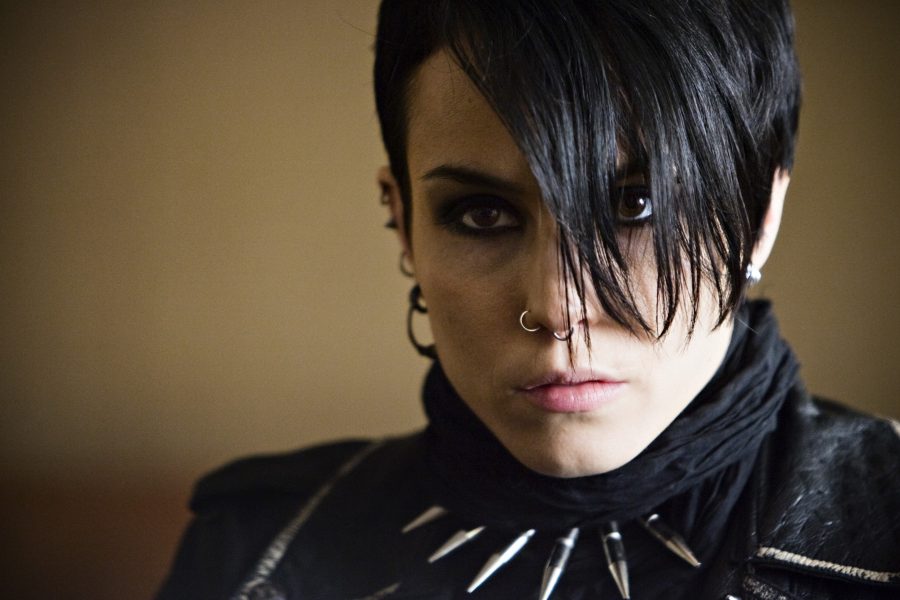
The mystery surrounding the disappearance of Henrik Vanger’s niece, Harriet, is one of the more suspenseful, entertaining parts of director Niels Arden Oplev’s Swedish film, Girl with the Dragon Tattoo.
But as the movie plays out, Harriet’s disappearance ranks as least interesting on the filmmakers’ list of gutsiest sub-plots and elements. This includes, but is not limited to, Nazis, Levitical-based murders, multiple graphic rapes, the exchange of information and brand laptops, hunters “mistaking” men for beasts and the occasional visit to a torture room.
Investigative reporter, Mikael Blomkvist (Micahel Nyqvist), has six months before serving a prison sentence for which he was framed. During that time, he accepts Vanger’s offer to solve the disappearance/murder of Harriet.
Originally hired by Vanger to research Blomkvist’s qualifications is the computer-hacking goth child, Lisbeth Salandar (Noomi Rapace). She, however, seems more inclined to find out if Blomkvist was guilty or not, hacking into his computer until she becomes engaged in solving the mystery, too.
Oplev’s film goes by quickly, checking off every interesecting element of the mystery formula and avoids anything regarding character development. To Oplev, a compelling character constitutes giving them one (count ‘em, one) behavioral trademark that marks them unique from the others.
These character “props” are more obvious in theatre – those ubiquitous canes, makeup/clothing, jogging shorts, framed pictures, glasses of scotch, et cetera. In this film, they become signifiers of a character’s psychological trait: Lisbeth is the woman scorned and scorning, Mikael’s perseverant jogging habits translate to his dogged investigative skills, framed pictures of dead flowers symbolize an elderly man’s dying hope, Martin’s “simple, human gesture” of offering a drink, et cetera.
The filmmakers (and perhaps, the source material) are too lazy. Lisbeth Salandar is not a particularly memorable character though Noomi Rapace certainly plays her well, that is, without over-dramatizing her. (Too bad the filmmakers couldn’t be the same way, especially with the unrestrained rape and torture scenes).
The film cheats in its depiction and development of Lisbeth. It justifies Lisbeth’s morally dubious acts by calling them acts of vengeance – because someone did them to her first. Following this idea, the film ends on a fairly cliche note, creating a situation where Lisbeth “deserves” her reward, and accepts it on behalf of all mistreated women.
Protagonist/anti-hero Lisbeth is softened by the contrast of her buddy protagonist/hero Blomkvist. In one scene that defines the film’s greatest weakness, Blomkvist whispers something resembling the following: “I don’t know what you’ve been through; I like you just the way you are.”
It’s a sham of a scene, bookended by flasbhack cuts to Lisbeth’s disturbing childhood meant to make it easier for the audience to like Lisbeth. We know what she’s suffered and done.
The filmmakers don’t even believe the dialogue they wrote for the one-dimensional Blomkvist.
Later on, there’s a “return to a long-lost mother” scene that exists only for emotional trumpet playing. It hands the audience the correct method for responding to Lisbeth’s character instead of letting us do that as she organically grows from and shapes the story.
The problem with Lisbeth, as portrayed, is that she’s not a brave character, and neither are the filmmakers for inhibiting her. If a character only acts when acted upon, they are no longer a believable character but another component of a mechanical plot.
As a representative example, Lisbeth would be a much stronger character if she were the one to attack the men in the metro instead of being attacked by them first and returning the act of violence.
Oplev and screenwriters were not brave enough to depict human beings doing bad things. They fail to realize that watching human beings err and having to make choices is what often makes the best stories.
Girl with a Dragon Tattoo clings to the Hollywood formula of bad people vs. good people who have had bad experiences in the past. It’s okay for evening entertainment, but if you look any closer, it only shows off its psychological/sociological importance.
The book’s original title in Sweden is “Men Who Hate Women.” The film, like the portrayal of Lisbeth, is carelessly enclosed by that title. It’s not that the film’s content openly encourages a hatred of women in the same way that the male characters within it practice. It just doesn’t give the audience any reason to appreciate them beyond objects of desire or hate.





